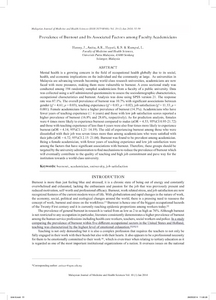Citation
Jaswantlal, Henny and Abdul Rahman, Anita and Kadir @ Shahar, Hayati and Gyanchand Rampal, Lekhraj Rampal
(2014)
Prevalence of burnout and its associated factors among faculty academicians.
Malaysian Journal of Medicine and Health Sciences, 10 (1).
pp. 51-59.
ISSN 1675-8544
Abstract
Mental health is a growing concern in the field of occupational health globally due to its social, health, and economic implications on the individual and the community at large. As universities in Malaysia are advancing towards becoming world-class research universities, academicians are now faced with more pressures, making them more vulnerable to burnout. A cross sectional study was conducted among 194 randomly sampled academicians from a faculty of a public university. Data was collected using a self-administered questionnaire to assess the sociodemographic characteristics, occupational characteristics and burnout. Analysis was done using SPSS version 21. The response rate was 87.1%. The overall prevalence of burnout was 10.7% with significant associations between gender (χ2 = 4.61; p = 0.03), teaching experience (χ2 = 0.83; p = 0.02), job satisfaction (χ2 = 11.33; p = 0.001). Female academicians have a higher prevalence of burnout (14.3%). Academicians who have fewer years of teaching experience (¬ 6 years) and those with low job satisfaction scores reported a higher prevalence of burnout (16.8% and 28.6%, respectively). As for prediction analysis, females were 4 times more likely to experience burnout compared to males (aOR = 4.53; 95%CI 0.95-21.72) and those with teaching experience of less than 6 years were also four times more likely to experience burnout (aOR = 4.14; 95%CI 1.21–14.19). The odd of experiencing burnout among those who were dissatisfied with their job was seven times more than among academicians who were satisfied with their jobs (aOR = 6.72; 95%CI 2.15–21.04). Burnout was found to be prevalent among academician. Being a female academician, with fewer years of teaching experience and low job satisfaction were among the factors that have significant associations with burnout. Therefore, these groups should be targeted by the university administration to find mechanisms to reduce the prevalence of burnout which will eventually contribute to the quality of teaching and high job commitment and pave way for the institution towards a world-class university.
Download File
![[img]](http://psasir.upm.edu.my/41391/1.hassmallThumbnailVersion/Prevalence%20of%20burnout%20and%20its%20associated%20factors%20among%20faculty%20academicians.pdf)  Preview |
|
PDF (Article)
Prevalence of burnout and its associated factors among faculty academicians.pdf
Download (128kB)
| Preview
|
|
Additional Metadata
Actions (login required)
 |
View Item |

